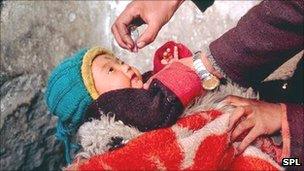Polio outbreak: Where now for global eradication drive?
- Published

Polio has reappeared in China
A massive vaccination campaign is under way in China after an outbreak of polio, more than 10 years after the country was declared polio free. What are the implications for the global effort to eradicate the disease?
Health officials in China are taking strong measures in their drive to stop an outbreak of polio.
Children who have been given the vaccine are marked behind the ears with indelible ink to make sure there is no confusion.
Vaccination is taking place in homes, kindergartens, schools, bus stations and airports, according to the Global Polio Eradication Initiative, which is leading the worldwide effort to wipe out the disease.
Until a few weeks ago, polio was a disease of the past in China, as in most countries around the world. But the discovery of 10 cases of polio in the western province of Xinjiang, and one death, has lead to millions of children and young adults being vaccinated.
Genetic studies show the virus came across the border from neighbouring Pakistan. Polio still has a foothold in Pakistan, along with three other countries - India, Afghanistan and Nigeria.
There have also been sporadic cases in other formerly polio-free countries - such as parts of western Africa - as the virus is brought in by travellers.
"There is an urgent need to eradicate this disease in the remaining endemic areas because it is from there that it will continue to spread," says Oliver Rosenbauer, of the World Health Organization.
"The focus has to be on the endemic countries."
The Global Polio Eradication Initiative was launched in 1988, with the aim of ridding the world of polio. It has two main strategies - mass vaccination and careful surveillance for new cases.
Since 1988, the number of cases have fallen by more than 99%. But persistent pockets of polio transmission in northern India, northern Nigeria and on the border between Afghanistan and Pakistan continue to put unvaccinated children everywhere at risk. Since 2000, polio cases have hovered at about 1,000 a year.

Delivering vaccine to impoverished states in India is a major challenge
India, with its huge population and poor health facilities in some states, presents a major challenge in efforts to wipe out polio. It has reported only a single case this year, but, concerned about the possibly of polio spreading from Pakistan, the government has set up vaccination booths at major border crossings.
Security issues in parts of Afghanistan and Pakistan make vaccination programmes there very difficult; while Nigeria, which has about 30 cases this year, is continuing its efforts to control the virus, after previous setbacks.
A further challenge is funding. The Global Polio Eradication Initiative says the funding gap up to the end of 2012 is $590m.
"This is really a risk we shouldn't have to be taking at this stage of the game," says Oliver Rosenbauer.
Some observers believe we have reached the last mile in eradicating polio.
But Dr Heidi Larson, a vaccine expert at the London School of Hygiene and Tropical Medicine, says it's not clear how long the last mile will take.
"We're very close but we've been close for over a decade now," she says. "We are in the last mile but that last mile can take us six months or it can take six years.
"The most important thing is that we cannot give up, because if we do the cost will be tremendous - at a financial level, at a health impact level and an overall cost of public confidence in some vaccines."
- Published20 September 2011